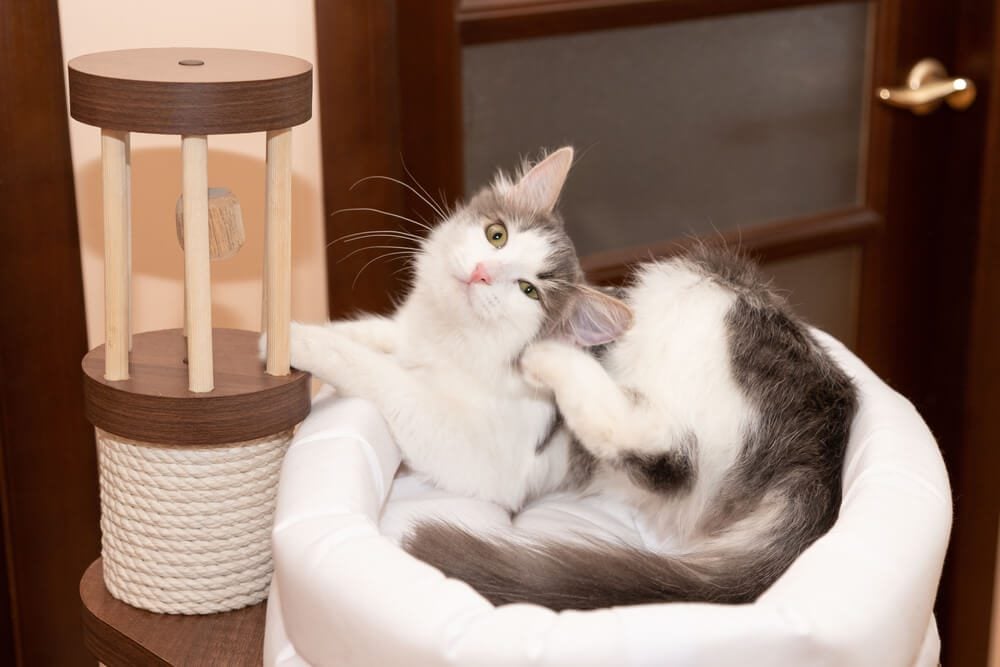Cat Scratching Ears: Causes, Symptoms, and Treatments

Table of Contents
Is it Normal for Cats to Scratch Their Ears?

Yes, a cat scratching ears is normal.
Cats are very particular when it comes to grooming. Scratching the ears is a way of keeping them clean and, therefore, falls under grooming practices. So, a cat scratching ears as part of its diligent grooming routine is normal.
However, if the ear itchiness is excessive and you see your cat constantly searching its ears, it is probably due to an underlying ear problem. Some cat breeds are more prone to ear scratching because they are at a higher risk of certain ear problems.
For example, Persian cats produce more ear wax than other breeds. Persian and Himalayan cats are also more likely to suffer from ringworm. In both cases, the result can be excessive ear scratching.
Why Does My Cat Scratch Their Ears So Much?
From dermatitis to ear infections to ear mite infestations – there are many reasons a cat would scratch its ears. Here is a more detailed look at some of the most common causes of cat scratching ears.
- Ear Mites: Cat ear mites (Otodectes cynotis) are tiny parasites (invisible to the naked eye) that live in the cat’s ear canal and feed on ear wax. Ear mite infection is the most common ear problem in cats. Symptoms of ear mites include excessive scratching and ear discharge in the form of dark speckles, similar to coffee grounds.
- Ear Infections: Cat ear infections are a common issue, and based on location, there are three types – infection of the outer ear (otitis externa), the middle ear (otitis media), and the inner ear (otitis interna). As for causes, yeasts and bacteria are the most common culprits.
- Allergies: Allergies in cats often manifest with generalized itchiness – the cat will scratch its body and its ears. This is true for both environmental allergies and food allergies. Common allergens are pollen, dust, mites, and certain foods like chicken and beef.
- Foreign Bodies: It is not uncommon for cats to get a foreign body in their ear canals. The most common types of foreign bodies are grass awns, grass seeds, and foxtails. If your cat is scratching one ear more than the other, a foreign object in the ear is a likely scenario.
- Wounds: Cats often fight with each other and can be attacked by dogs. In both cases, the result can be ear injuries. If these injuries get infected and form abscesses, they are likely to get very itchy.
- Ringworm: Despite its name, ringworm (feline dermatophytosis) is a fungal infection that causes circular and itchy rashes. A cat scratching ears might have ringworm lesions near or around the ear basis. Ringworm is a zoonosis and requires immediate veterinary attention -although, not life-threatening, the itchiness is a nuisance and should be managed early on.
- Polyps & Tumors: Ear polyps are likely in younger cats and tumors in older cats. Polyps usually start from the middle ear and then grow through the ear canal and rupture the ear drum. Tumors can develop anywhere in the ear. These ear growths block the ear canal, cause ear wax buildup, and create a favorable environment for ear infections.
How Can I Treat My Cat’s Itchy Ears?

If the cat scratching ears scenario becomes an everyday thing, you need to get proactive. Take a look at your cat’s ears and see if there is something out of the ordinary – like hair loss around the ears, redness of the ear flap, or the presence of coffee grounds-like debris.
If you notice some of these symptoms, it is best to see a vet. However, if there is nothing unusual with the cat’s ears from the outside, you can try a cleansing ear solution or use a cotton swab and mineral oil to clean the outer portion of the ear. If your cat keeps scratching, you will still need to see the vet.
When Should I Go to the Vet for Cat Scratching Ears?
As explained, you should see the vet for cat scratching ears if the habit is overly pronounced or if the cat is showing additional signs and symptoms.
Such red flags would be ear discharge, bad odor from the ears, ear flap irritation and redness, hair loss & crusts around the ears, head shaking, and in more severe cases, changes in appetite and lethargy. A cat with infected ears (otitis) can even develop a fever (increased body temperature).
The vet will examine the cat, take its medical history, and then check the ears. To get a better look into the ear canal and deeper ear structures, the vet uses a special lighting device – an otoscope. They can also take an ear discharge sample and observe it under a microscope.
This will help the vet make a diagnosis and prescribe a treatment plan that will solve the problem and stop the ear itchiness. The treatment is usually in the form of topical meds, like cat ear drops. In more severe cases, the vet can prescribe oral medications as well.
If left untreated, ear problems in cats can result in a damaged hearing or even hearing loss. That is why it is important to go to the vet when you have a cat scratching ears.
How do I Prevent Itchy Cat Ears?

Some causes of itchy ears in cats cannot be prevented. However, keeping the ears clean can help decrease the risk of certain causes of cat scratching ears. Here is an explanation of how to care for your cat’s ears.
- Cat Ear Cleaners: There are many cat ear cleaning solutions that can be used regularly to keep the cat’s ears clean and healthy. After applying these solutions, you can use a cotton swab to remove the excess moisture from the outer ear. However, never use q-tips when cleaning the ears, as you can accidentally damage the ear drum.
- Cat Ear Wipes: Instead of liquid solutions, some pet owners prefer using cat ear wipes. They are practical and budget-friendly. Cat ear wipes come in different formulas – from wipes for everyday cleaning to medicated wipes.
- External Parasite Control: There are spot-on products that prevent infestations with external parasites, including ear mites. Talk to your DVM about the different types of such products and which one would be best for your cat.
- Vaccination: Keeping your cat up-to-date on vaccines is paramount for pet health. Ear issues can occur in all cats, but cats with certain immune-weakening diseases like FeLV are at higher risk of developing ear infections. Regular vaccination prevents FeLV.
- Regular Vet Visits: Finally, ensure your cat is regularly examined by your vet. Checkups are an opportunity to catch ear problems ear on and before they make your cat’s ears overly itchy and scratchy.


















